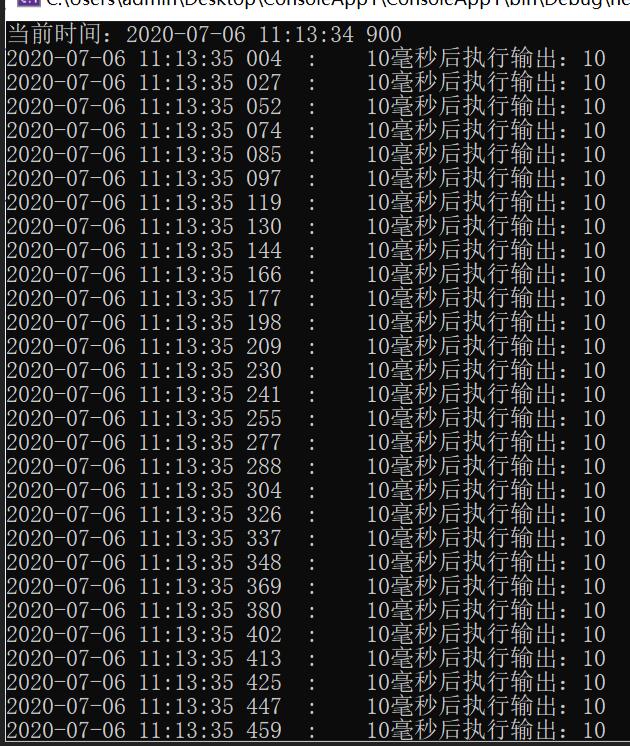111,120
社区成员
 发帖
发帖 与我相关
与我相关 我的任务
我的任务 分享
分享 并不是很精准。
并不是很精准。
static async void test()
{
List<int> timeList = new List<int>() { 2, 4, 6, 8 };
Console.WriteLine($"当前时间:{DateTime.Now}");
foreach (var item in timeList)
{
Task t = Task.Run(async () =>
{
await Task.Delay(item * 1000);
Console.WriteLine(DateTime.Now + $":{item}秒后执行输出:{item}");
});
await t;
}
}
using System;
using System.Collections.Generic;
using System.Text;
using System.Threading;
using System.Runtime.InteropServices;
namespace HighTimer
{
public class TimerEventArgs : EventArgs
{
private long clockFrequency;
public long ClockFrequency
{
get { return clockFrequency; }
}
private long previousTickCount;
public long PreviousTickOunt
{
get { return previousTickCount; }
}
private long currentTickCount;
public long CurrentTickCount
{
get { return currentTickCount; }
}
public TimerEventArgs(long clockFreq, long prevTick, long currTick)
{
this.clockFrequency = clockFreq;
this.previousTickCount = prevTick;
this.currentTickCount = currTick;
}
}
/// <summary>
/// 高精度定时器事件委托
/// </summary>
public delegate void HighTimerEventHandler(object sender,TimerEventArgs e);
public class HighAccurateTimer
{
[DllImport("Kernel32.dll")]
private static extern bool QueryPerformanceCounter(out long lpPerformanceCount);
[DllImport("Kernel32.dll")]
private static extern bool QueryPerformanceFrequency(out long lpFrequency);
public event HighTimerEventHandler Elapsed;
Thread thread;
private object threadLock = new object();
private long clockFrequency = 0;
private long intevalTicks = 0;
private long nextTriggerTime = 0;
private int intervalMs;
/// <summary>
/// 定时器间隔
/// </summary>
public int Interval
{
get
{
return intervalMs;
}
set
{
intervalMs = value;
}
}
private bool enable;
/// <summary>
/// 启动定时器标志
/// </summary>
public bool Enabled
{
get
{
return enable;
}
set
{
enable = value;
if (value == true)
{
intevalTicks = (long)(((double)intervalMs / (double)1000) * (double)clockFrequency);
long currTick = 0;
GetTick(out currTick);
nextTriggerTime = currTick + intevalTicks;
}
}
}
/// <summary>
/// 构造函数
/// </summary>
public HighAccurateTimer()
{
if (QueryPerformanceFrequency(out clockFrequency) == false)
{
return;
}
this.intervalMs = 1000;
this.enable = false;
thread = new Thread(new ThreadStart(ThreadProc));
thread.Name = "HighAccuracyTimer";
thread.Priority = ThreadPriority.Highest;
thread.Start();
}
/// <summary>
/// 进程主程序
/// </summary>
private void ThreadProc()
{
long currTime;
GetTick(out currTime);
nextTriggerTime = currTime + intevalTicks;
while (true)
{
while (currTime < nextTriggerTime)
{
GetTick(out currTime); //决定时钟的精度
}
nextTriggerTime = currTime + intevalTicks;
if (Elapsed != null && enable == true)
{
Elapsed(this, new TimerEventArgs(clockFrequency, currTime - intevalTicks, currTime));
}
}
}
/// <summary>
/// 获得当前时钟计数
/// </summary>
/// <param name="currentTickCount">时钟计数</param>
/// <returns>获得是否成功</returns>
public bool GetTick(out long currentTickCount)
{
if (QueryPerformanceCounter(out currentTickCount) == false)
{
return false;
}
else
{
return true;
}
}
/// <summary>
/// 注销定时器
/// </summary>
public void Destroy()
{
enable = false;
thread.Abort();
}
}
}
